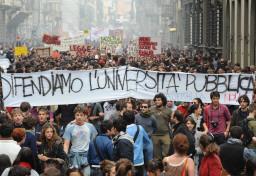Italian Premier Silvio Berlusconi said Wednesday he would send in police to break up sit-ins by students at schools and universities as a second day of nationwide protests against proposed government education cuts got under way.
''(A sit-in) is a violent act, and today I will meet (Interior Minister Roberto Maroni) to give him instructions on how the police should intervene,'' he said in a special press conference on the education reforms in the light of the protests.
''The state must carry out its role of guaranteeing the right of students who want to study to be able to enter classrooms and lecture halls,'' the premier added.
Berlusconi's announcement came the same day newspapers carried front page photos of students clashing with police in riot gear in Milan on Tuesday.
Six students were injured when police used batons and tear gas to break up a 500-strong student sit-in at a Milan rail station, while around 100,000 students took part in marches and occupied universities elsewhere in the city and in Florence, Rome and Naples.
On Wednesday students in Bari, Rome and Turin continued the protest, occupying university halls and departments.
Opposition Democratic Party (PD) shadow youth policy minister Pina Picierno described Berlusconi's plan to send police to break up the sit-ins as ''irresponsible and dangerous''.
''The premier's decision to use law and order forces against families and students who are protesting to defend their right to study is extremely serious. It's an unthinkable act that damages fundamental constitutional rights,'' she said.
The leader of Italy's large CGIL trade union, Guglielmo Epifani said it was ''deeply wrong'' to threaten students involved in ''peaceful protests'', adding that dialogue was the only suitable response.
Earlier on Wednesday PD leader Walter Veltroni called on the government to withdraw the decree on education reforms in the face of the widespread protests.
At the special press conference, the premier said the government would press ahead with the reforms and blamed opposition parties for fueling student protests with ''lies and false messages'' about the contents of the decree drawn up by Education Minister Maria Stella Gelmini.
The package, which is being discussed in the Senate, includes cuts of 1.5 billion euros to the university sector over the next five years and would reduce the number of degree courses available - currently 5,500, which Gelmini said was double the European average.
It would also allow universities to become foundations in order to top up public funding with private investments.
The same decree contains controversial reforms for schools, including a return to a single-teacher system for most subjects for children in elementary schools, and grades for behaviour for secondary school kids in an effort to stamp out bullying.









